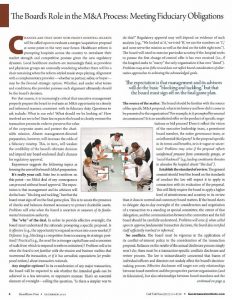The Board’s Role in the M&A Process: Meeting Fiduciary Obligations
 Chances are that most non-profit hospital boards will be called upon to evaluate a merger/acquisition proposal at some point in the very near future. Healthcare reform is prompting hospitals across the country to reevaluate their market strength and competitive posture given the new regulatory dynamic. Local healthcare markets are increasingly fluid, as providers and physician groups are anxiously wondering whether there will be a chair remaining when the reform-styled music stops playing. Alignment with a complementary provider- whether as partner, seller, or buyer may be the favored strategic option. Whether, and under what terms and conditions, the provider pursues such alignment ultimately should be the board’s decision.
Chances are that most non-profit hospital boards will be called upon to evaluate a merger/acquisition proposal at some point in the very near future. Healthcare reform is prompting hospitals across the country to reevaluate their market strength and competitive posture given the new regulatory dynamic. Local healthcare markets are increasingly fluid, as providers and physician groups are anxiously wondering whether there will be a chair remaining when the reform-styled music stops playing. Alignment with a complementary provider- whether as partner, seller, or buyer may be the favored strategic option. Whether, and under what terms and conditions, the provider pursues such alignment ultimately should be the board’s decision.
For that reason, it is increasingly critical that executive management properly prepare the board to evaluate an M&A opportunity in a timely and informed manner, consistent with its fiduciary duty. Questions to ask include: What is our role? What should we be looking at? How involved are we to be? State law expects the board to closely oversee the transaction process in order to preserve the value of the corporate assets and protect the charitable mission. Absent management-directed preparation, however, will increase the odds of a fiduciary misstep. This, in turn, will weaken the credibility of the board’s ultimate decisions and imperil any board-endorsed deal’s chances for regulatory approval.